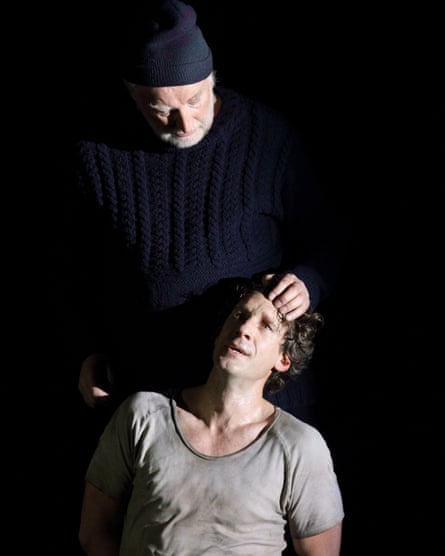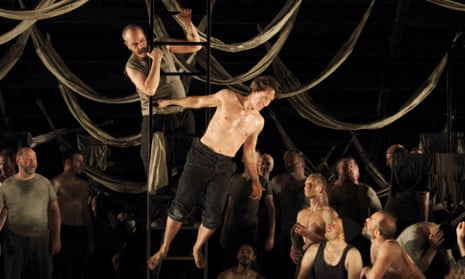Tangle up his hammock, mess his kit, spill his grog. With this childish incitement to spite, the tyrant Master-at-Arms seals the fate of the new boy aboard, handsome, genial Billy Budd, whose only weakness is to stammer. All humanity’s cruelty is compressed into this snapshot moment. It’s the kernel of Benjamin Britten’s opera, based on Herman Melville’s tale set on board the HMS Indomitable in the French revolutionary wars.
In a strong production, Billy Budd can seem Britten’s greatest stage work (there can be no absolutes, with Peter Grimes or Turn of the Screw in contention). Deborah Warner’s striking and perceptive staging for the Royal Opera House (ROH), first seen at Teatro Real, Madrid, makes a fiercely eloquent case. Leading the predominantly British cast, baritone Jacques Imbrailo (Billy Budd), tenor Toby Spence (Captain Vere) and bass Brindley Sherratt (Master-at-Arms, John Claggart) show the complexities of the piece. It’s no mere battle of good and evil, but something less obvious, more subtle and richly troubling.
The set, designed by Michael Levine with lighting by Jean Kalman, tells the story. Ladders, canvas, ropes, planks and splashing water create the enclosed world of a battleship in the era of sail. Chloé Obolensky’s costumes are updated to generic peak-caps and brass-buttoned jackets for the officers, drab duck for the men below deck. We’re in no time, all time. The triple layered, slightly heaving, stage brings alive the claustrophobia of life at sea, with its ominous shadow of mutiny.
Britten conducted the world premiere at Covent Garden in 1951, later revising the four acts to two, the version commonly seen today. With “depression and anxiety looking over my shoulders”, he struggled with the work, and with his librettists, Eric Crozier and the ever-pernickety EM Forster. Essentially tonal but pushing harmonic ambiguity to its limit, the score is absolutely assured, revealing nothing of that anguish. With solo alto saxophone, volleys of low brass, silvered, glowing strings and, depicting Billy’s stammer, the trill of muted trumpet and woodblock, Britten amplifies character and atmosphere: Melville’s original, far less economical, here gains meaning. Ivor Bolton conducted a nuanced performance, raw, radiant and tender, expertly played by the Royal Opera House orchestra, a few rough edges notwithstanding.

Imbrailo, a memorable Budd in Michael Grandage’s production for Glyndebourne nearly a decade ago, remains as vocally virile and easily physical, shimmying up and down ropes, jumping off ladders. Blithe and generous Budd may be, the angel who must die. Yet he has a barely contained violence that enables him to kill Claggart with a single blow. Imbrailo never allows us to forget that. Harder to believe is the notion that the depraved Claggart ever knew love or kindness. Warner, and Sherratt in his sinister portrayal, oily and glistening, invite us to see some past suffering as the source of his brutality.
As the ship’s beloved captain, “Starry” Vere, Toby Spence conveys the frailty of conscience, the dilemma of leadership, which can make the most powerful weak. This Vere is uneasy, indulgent, unknowable: a multi-faceted interpretation. In his ROH debut, Sam Furness shone as the bullied Novice. David Soar (Mr Flint), Peter Kellner (Lieutenant Ratcliffe), Thomas Oliemans (Mr Redburn) and Clive Bayley (Dansker) led the large all-male cast. The 60-strong chorus, with 30 actors on stage adding to the mood of overcrowding, lets rip magnificently. Needling and disturbing, this production demands as much as it delivers. Warner, one of our most astute directors, lets no one off lightly, least of all the audience.
The annual Holy Week festival at St John’s Smith Square, presented in partnership with Tenebrae and this year focusing on James MacMillan, offers a seasonal showcase both for choral music and choirs. The Good Friday performance of Bach’s St John Passion, performed by Polyphony and the Orchestra of the Age of Enlightenment (OAE), conducted by Stephen Layton, is now a tradition of this festival, but one that remains fresh and vigorous.
Layton’s commitment to new music (John Tavener, several Baltic composers) feeds into the distinctive colour and voicing of Polyphony when they sing Bach. Jammed close together on the small stage of St John’s Smith Square, they excel in clarity of narrative and integrity of sound. You can find more dramatic performances elsewhere. This isn’t Layton’s only priority. Nick Pritchard’s masterly Evangelist is a truthful reporter, a cool witness to the crucifixion story without gilding the telling. Each of the soloists (Rowan Pierce, Ruairi Bowen, Helen Charlston among them) had moments of glory.
The OAE players are so versatile that, a few weeks ago, the section principals performed their solos from memory and joined the action in Peter Sellars’s semi-staging with Simon Rattle conducting. At St John’s Smith Square, in contrast, they were embedded in the music’s texture, rather than adorning it. There are as many ways to perform this music as there are notes in the score, colours in the spectrum. That is the miracle of Bach.
Star ratings (out of five)
Billy Budd ★★★★
Holy Week festival ★★★★
Billy Budd is in rep at the Royal Opera House, London, until 10 May

Comments (…)
Sign in or create your Guardian account to join the discussion